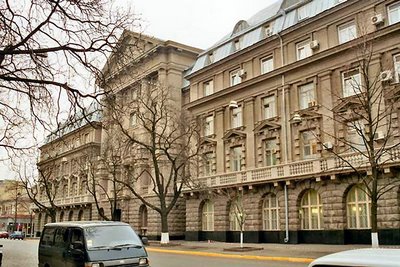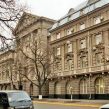
Russia’s Ideological Crusade Against Ukraine
Publication: Eurasia Daily Monitor Volume: 6 Issue: 113
By:

According to an interview with Ukraine’s Ambassador to Russia Konstantyn Hryshchenko, the country’s bilateral relationship with Russia has sunk to its lowest level since the disintegration of the Soviet Union, testimony to the Russian state control of the media and its ideological crusade against Ukraine (www.profil-ua.com, June 6). In the weekly Glavred magazine on May 20 its front cover declared: "Beware Ukrainophobia!"
The Levada Center recently found that 62 percent of Russians hold a negative view of Ukraine with only the United States and Georgia being seen in a worse light. At the same time, 91 percent of Ukrainians hold positive views of Russia, a reflection of media pluralism and the lack of state directed propaganda against Russia. Analyzing these polls, the head of the Center for Military-Political Research in Kyiv summarized this relationship in his headline: "We like them but they do not like us" (www.pravda.com.ua, May 5).
The Ukrainian Security Service (SBU) is openly raising the question of the intensification of Russian intelligence activities within Ukraine, and Russia’s return to Soviet KGB tactics. This concern was expressed in SBU chairman Valentyn Nalyvaychenko’s comment that the FSB within the Black Sea Fleet should withdraw from the Crimea (www.radiosvoboda, June 2). Nalyvaychenko explained that one of the functions of the SBU was counter-espionage, and that was why they did not agree with the FSB being based in the Fleet.
The main suspects of the murder in Odessa on April 17 of a student member of the Ukrainian nationalist NGO Sich, Maksym Chayka, belong to the "Antifa(scist)" NGO financed by the Russian nationalist Rodina party. The presidential secretariat requested that the SBU investigate their activities to discover if they are coordinated "with foreign organizations of an anti-Ukrainian orientation" (www.president.gov.ua, April 22). The SBU appealed to the justice ministry to consider if there were grounds to revoke Rodina’s registration, based on among things, their link to organized crime and financing from abroad. The suspects have fled to Russia.
The conflict between the Sich and Antifa NGO’s is historically based; specifically the controversy surrounding the unveiling of a monument to Empress Catherine in Odessa in October 2007. Ambassador Hryshchenko pointed out that unlike the constant Russian interference in Ukraine, Kyiv does not protest against Russian glorification of Tsar Peter and Tsarina Catherine -even though both are regarded very negatively in Ukraine. Ukrainian history equates both Russian leaders as the destroyers of the Ukrainian autonomous Hetmanate in the late eighteenth century and the re-organization of Ukrainian territories into gubernia, as well as the introduction of serfdom and the banning of the Ukrainian language.
The Russian foreign ministry assumes the right to condemn the unveiling of monuments to historical figures in Ukraine. For example, Ukraine will unveil a monument to Cossack Hetman Ivan Mazepa on Independence Day (August 24) in his home region of Poltava on the occasion of the 300th anniversary of the Battle of Poltava, where Ukrainian-Swedish forces were defeated by Russia. Mazepa has undergone rehabilitation as a hero in independent Ukraine, and his picture is displayed on the 10 hryvnia note.
The Russian Orthodox Church imposed an "anathema" on Mazepa and he was condemned as a "traitor" to Russian-Ukrainian unity by tsars and commissars alike. The on-going furore has led to a split within the Ukrainian Orthodox Church (Moscow Patriarchate) with Metropolitan Dmytruk, the head of the UOC’s foreign relations, supporting the growing call to remove the church’s anathema (www.pravda.com.ua, May 26).
Russia’s new historiography incorporates additional Russian chauvinists, such as White Army General Anton Denikin. Prime Minister Vladimir Putin’s recent reference to Denikin’s description of Russia and Ukraine as "great" and "little" Russia shows the degree to which these Russian views of Ukraine remain deep seated. Putin’s use of "little Russia" infuriated all shades of Ukrainian opinion. As Ukrainian historians pointed out, Denikin hated "Ukrainian separatism" more than he did the Bolsheviks, and this was his undoing. Denikin’s march on Moscow was foiled by uprisings in Ukraine, where his forces terrorized everything Ukrainian (www.unian.net, May 28).
Memoirs published in the West after the Russian revolution by white Russian émigrés described "Ukrainian separatism" as an "Austrian" plot against Russia. "Ukrainian separatism" in the 1990’s evolved into a "Western plot," while two thirds of Russians in January 2005 believed that the Orange Revolution was an "American conspiracy" (see the critical review of the new anti-Ukrainian book "American Salo [pork fat]" www.unian.net, May 29).
These views of Ukraine’s "artificiality" and "fragility" remain deeply rooted within the Russian mindset, and explain the state orchestrated campaign depicting Ukraine as a "failed state" that requires international supervision. Putin described Ukraine as an "artificial" entity with lands given to it by Russia and the USSR during his speech to the NATO-Russia Council in Bucharest in April 2008. The March 16 issue of Russian political scientist Gleb Pavlovsky’s Ruskyi Zhurnal was devoted to "Will Ukraine Lose its Sovereignty?" (www.russ.ru).
Ukraine’s former Ambassador to the United States Yuriy Shcherbak, wrote a lengthy analysis of the campaign conducted by senior Russian officials. Shcherbak believes that the aim is an "ideological-propaganda preparation of a future operation for the seizure of the territory of a sovereign state" (Den, May 26).
One of the Russian officials named by Shcherbak was the director of the Institute for CIS Countries Konstantin Zatulin, who recently called upon Russia to see ethnic Russians in Ukraine "in the same rank as the army, the fleet and church" (www.russkie.org). Zatulin was again denied entry to Ukraine at Simferopol airport. The SBU spokesperson explained this by saying that Zatulin remained on a banned list of Russians entering Ukraine. More importantly, "The stance of the SBU on this question is very tough: independent of the citizenship and position held (of the person) there is no place in Ukraine for separatists and extremists" (www.pravda.com.ua, June 6).
In their rush to "reset" the button with Russia after its invasion of Georgia and Barack Obama’s election, Brussels and Washington have ignored Russia’s ideological crusade against Ukraine. They should heed the warning from Ambassador Shcherbak, who believes Russia’s ultimate aim is to "destroy Ukrainian statehood" (Den, May 26).




